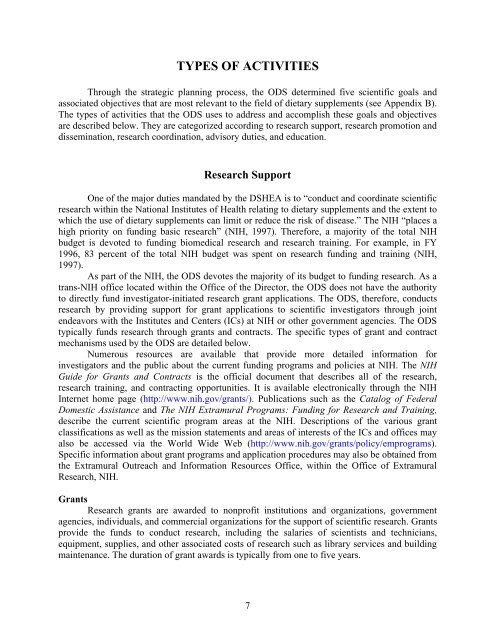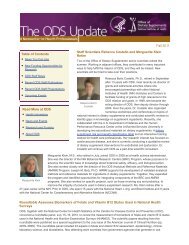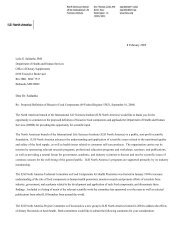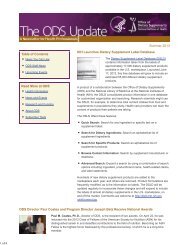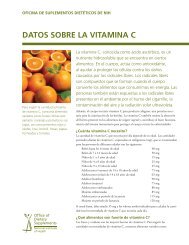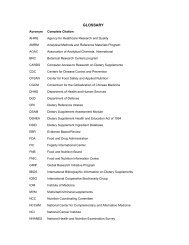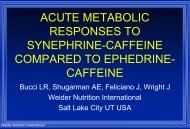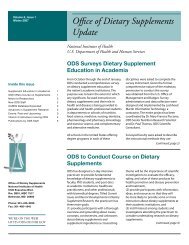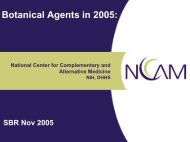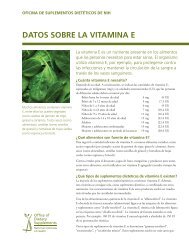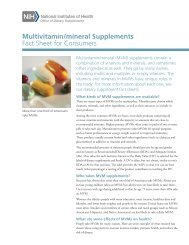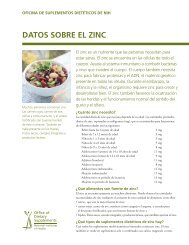status report - Office of Dietary Supplements - National Institutes of ...
status report - Office of Dietary Supplements - National Institutes of ...
status report - Office of Dietary Supplements - National Institutes of ...
Create successful ePaper yourself
Turn your PDF publications into a flip-book with our unique Google optimized e-Paper software.
TYPES OF ACTIVITIES<br />
Through the strategic planning process, the ODS determined five scientific goals and<br />
associated objectives that are most relevant to the field <strong>of</strong> dietary supplements (see Appendix B).<br />
The types <strong>of</strong> activities that the ODS uses to address and accomplish these goals and objectives<br />
are described below. They are categorized according to research support, research promotion and<br />
dissemination, research coordination, advisory duties, and education.<br />
Research Support<br />
One <strong>of</strong> the major duties mandated by the DSHEA is to “conduct and coordinate scientific<br />
research within the <strong>National</strong> <strong>Institutes</strong> <strong>of</strong> Health relating to dietary supplements and the extent to<br />
which the use <strong>of</strong> dietary supplements can limit or reduce the risk <strong>of</strong> disease.” The NIH “places a<br />
high priority on funding basic research” (NIH, 1997). Therefore, a majority <strong>of</strong> the total NIH<br />
budget is devoted to funding biomedical research and research training. For example, in FY<br />
1996, 83 percent <strong>of</strong> the total NIH budget was spent on research funding and training (NIH,<br />
1997).<br />
As part <strong>of</strong> the NIH, the ODS devotes the majority <strong>of</strong> its budget to funding research. As a<br />
trans-NIH <strong>of</strong>fice located within the <strong>Office</strong> <strong>of</strong> the Director, the ODS does not have the authority<br />
to directly fund investigator-initiated research grant applications. The ODS, therefore, conducts<br />
research by providing support for grant applications to scientific investigators through joint<br />
endeavors with the <strong>Institutes</strong> and Centers (ICs) at NIH or other government agencies. The ODS<br />
typically funds research through grants and contracts. The specific types <strong>of</strong> grant and contract<br />
mechanisms used by the ODS are detailed below.<br />
Numerous resources are available that provide more detailed information for<br />
investigators and the public about the current funding programs and policies at NIH. The NIH<br />
Guide for Grants and Contracts is the <strong>of</strong>ficial document that describes all <strong>of</strong> the research,<br />
research training, and contracting opportunities. It is available electronically through the NIH<br />
Internet home page (http://www.nih.gov/grants/). Publications such as the Catalog <strong>of</strong> Federal<br />
Domestic Assistance and The NIH Extramural Programs: Funding for Research and Training,<br />
describe the current scientific program areas at the NIH. Descriptions <strong>of</strong> the various grant<br />
classifications as well as the mission statements and areas <strong>of</strong> interests <strong>of</strong> the ICs and <strong>of</strong>fices may<br />
also be accessed via the World Wide Web (http://www.nih.gov/grants/policy/emprograms).<br />
Specific information about grant programs and application procedures may also be obtained from<br />
the Extramural Outreach and Information Resources <strong>Office</strong>, within the <strong>Office</strong> <strong>of</strong> Extramural<br />
Research, NIH.<br />
Grants<br />
Research grants are awarded to nonpr<strong>of</strong>it institutions and organizations, government<br />
agencies, individuals, and commercial organizations for the support <strong>of</strong> scientific research. Grants<br />
provide the funds to conduct research, including the salaries <strong>of</strong> scientists and technicians,<br />
equipment, supplies, and other associated costs <strong>of</strong> research such as library services and building<br />
maintenance. The duration <strong>of</strong> grant awards is typically from one to five years.<br />
7


